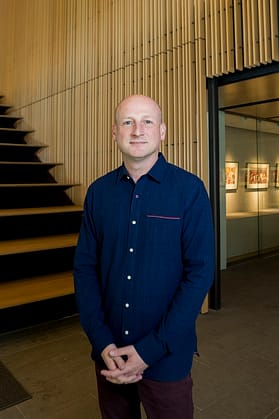Chief Executive Officer (2005-2024)

Steve Bloom led Portland Japanese Garden as CEO from 2005 to 2024 and transformed not only the landscape of Portland but the international field of Japanese gardens and the global conversation around the art and importance of cultural diplomacy. Bloom’s visionary approach promoted the belief that at the intersection of the built, natural, intellectual, and creative environments, humanity can achieve better mutual understanding. Through the creation of Portland Japanese Garden’s curatorial department –which oversees more than 200 events annually and has kept its grounds in world-class condition – Bloom has proven that cultural landscapes can be a platforms that use art, design, nature, dialogue, diplomacy, and knowledge to evolve societal attitudes and tolerances towards a more peaceful world.
Bloom is also responsible for the creation of Japan Institute, a sibling organization of Portland Japanese Garden with a vision of being the leading global platform outside Japan for sharing the nation’s greatest gifts with the world, including its culture, art, design, and unique connection to nature. Japan Institute, established in 2020, is based in Portland, but presents programming on six continents across the globe. Through the Institute, Bloom paved the path for its signature series of Peace Symposia titled “Peacemaking at the Intersection of Culture, Art, and Nature”, which have engaged notable and prestigious individuals and organizations such as Japan’s Imperial Family and the Nobel Peace Center.
Bloom has a successful track record of convening people from all around the world, beyond his work with Japan Institute’s Peace Symposia. In 2018, he brought the International Japanese Garden Conference to Portland – the largest of its kind ever held in the world. In 2022, he did the same with the national conference of the American Public Gardens Association. Bloom’s unwavering commitment and strategic ways of bringing people together was perhaps best demonstrated through his leadership of the Cultural Crossing Project at Portland Japanese Garden in 2017.
The Cultural Crossing Project was an endeavor that saw the opening of a new $37M Cultural Village designed by Kengo Kuma. Bloom was instrumental in recruiting the highly sought-after and prolific architect to the project, which would historically become Kuma’s first public project in North America. This project changed the landscape of architecture for Portland and Oregon, as it won more than 20 local, national, and international design awards and recognitions, and was selected by Architectural Digest as the best designed building project in the history of the State of Oregon. This project has led the way for numerous new Kuma projects in Oregon and across North America, significantly influencing the architectural portfolio of the continent. The Cultural Crossing Project made Portland a destination for architectural tourism, attracting designers and enthusiasts from around the world, and making Portland Japanese Garden the number one tourist attraction in the city of Portland.
Bloom was a 2008-09 Council on Foreign Relations International Affairs Fellow in Japan, and concurrently served as Visiting Scholar at Tokyo University of Agriculture. He served as the first Fellow in the history of the program to focus on cultural landscapes as a tool for foreign relations. Following and resulting from his fellowship in Japan, Bloom was the architect of the North American Japanese Garden Initiative which over the past decade has: 1) brought together for the first time in history, the international Japanese garden field through the creation of the North American Japanese Garden Association, of which he served as founding Board President; 2) established the Japanese Garden Training Center at Portland Japanese Garden, training practitioners from around the globe on the specialized skills of design, construction, and maintenance of Japanese gardens; and 3) created the Japanese Garden Library and Resource Center, which has amassed the second largest Japanese garden library collection in the world, second only to Tokyo Agriculture University.
Bloom has received multiple accolades for his contributions that transcend borders. In 2023, he was the recipient of the Oregon Consular Corps (OCC) Ambassador Award because of his contributions to Oregon’s economic vitality and quality of life. In 2022, Bloom was the recipient of the Kaneko Kentaro Award by the America-Japan Society for his longstanding contributions to advancing the relationship between the United States and Japan. In 2020, Bloom and Portland Japanese Garden received the American Public Gardens Association’s highest honor, the Garden Excellence Award, selected as the top public garden of its peers of 600 public gardens in more than 20 countries. In 2018, on the occasion of its 100th Anniversary, the Garden Society of Japan bestowed for the first time ever to a foreigner, honorary membership to Bloom because of his outstanding achievements in the promotion of Japanese gardens worldwide. For his promotion of Portland’s visitor industry, Bloom was presented the “2017 Portland Award” by Portland Mayor Ted Wheeler. In 2015, the Japanese Ministry of Foreign Affairs announced it was awarding the Foreign Minister’s Commendations in Honor of the 70th anniversary of the End of World War II. The award was given to individuals and groups with outstanding achievements in the promotion of friendship between Japan and the United States. Bloom was awarded this prestigious recognition along with only 27 other individuals.
Bloom’s vision for excellence, inclusion, and collaboration has not only brought world-class design to Oregon and North America but has inspired dialogue between peoples and across cultures about the importance of culture, art, and nature in bringing lasting harmony and peace to ourselves and each other.